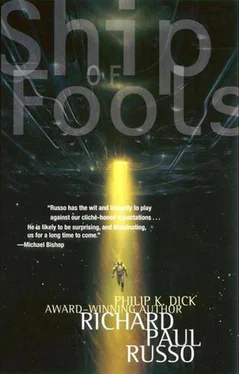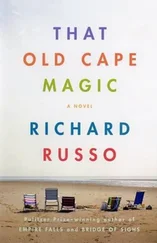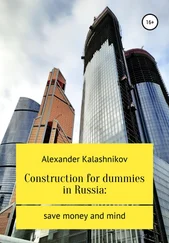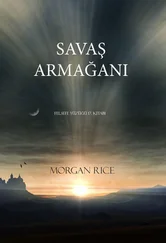“And this still works?”
“Yes. We tried it. Water and food have both been analyzed in the labs, and there doesn’t seem to be anything toxic in either, although no one has put it to the test. And the food is surprisingly nutritious. You’d get sick of the same thing all the time, I’m sure, but the lab techs say you could live on it forever.”
The bishop was silent for a long time; then he turned to me and I could see a faint smile. “This would be my idea of Hell,” he said. “It’s no wonder the poor woman lost her mind.”
We continued along the corridor in silence. When we reached the cluster of rooms, we went through each of them, but the bishop had no more questions or comments. Back in the corridor, he studied the strips of nacreous blue light that illuminated it.
Finally he spoke again. “Let us assume, purely for the sake of this discussion, that I don’t believe in God. That does not preclude my believing in evil. This ship is evil.”
“You really believe that?”
“Oh yes. Have you forgotten what has happened on this ship?”
“Accidents.”
“So many?”
“This is an alien starship. Everything about it is alien. We don’t understand it, we don’t know anything about it. Accidents are inevitable.”
“And how is Casterman an accident?” he asked.
“He’s not. But I don’t need ‘evil’ to account for a man killing himself. It’s infrequent, but not unknown.”
“He was a cleric,” the bishop said. “His faith was important to him. Suicide is a mortal sin.”
“For those who believe.”
“Yes, and Brother Casterman believed.”
“Did he? He didn’t act like a man of faith.”
The bishop nodded in acknowledgment. “He was a weak man in many ways. And yes, what you suspect is true: he was with the team to be my eyes and ears. So he was capable of deceit. But he believed, Bartolomeo. Suicide would have been unthinkable to him.”
“A mortal sin, you say, but you held a Mass for him.”
“Circumstances,” the bishop said. “I believe that, in a way, he did not kill himself. Something else did it to him.”
I shook my head, realizing we could go back and forth like this for hours, getting nowhere.
“And what about the others?” he added.
“What others?” Although I knew what he meant.
“Barry Sorrel. Sherry Winton. Starlin. Sorrel’s wife and daughter. Nazia Abouti. I can’t remember all the names. How do you account for them?”
“I don’t.”
“Exactly.”
But what the hell did “exactly” mean? I didn’t want to talk about it anymore. I was as disturbed by what had happened to people as the bishop was; probably more than he was. I didn’t pretend to understand it; I couldn’t even offer a reasonable explanation. But I knew that to attribute to the alien ship an abstract concept such as Evil, to somehow infuse this dead, inanimate object with that quality and blame our own psychological and emotional failings on it, was absurd. At the same time, I recognized that it was also absurd to deny that something extraordinary was occurring among those who had explored the ship, and that its effects were often devastating.
“What does it smell like?” I asked.
“What?”
“Evil.”
He gave me that faint smile again. “Like unwashed flesh and bodily wastes.”
With that, he started back along the corridor, and I followed.
“WEcannot continue in this way,” the bishop declared, his gaze slowly sweeping the long table and the twenty-four other people who sat around it. Instead of an Executive Council meeting, the bishop had requested a session of the full Planning Committee. It was a gamble. The rules were different, the dynamics uncertain—no one could count on committee member votes. Although the Executive Council could override any vote or action taken by the Planning Committee as a whole (the Executive Council formed a third of the Planning Committee, but acted independently as well), they would need seven votes out of eight to do so.
I was sitting with Maria Vegas and Dr. G. in chairs set back from the table. We were there primarily to answer questions, but it was also understood that we could participate in any aspect of the discussion, as long as we did not abuse that privilege. The eight Executive Council members sat together at one end of the table, Nikos at the head. Then there was a gap the size of an empty seat on each side, and the other members of the Planning Committee occupied the remainder of the table.
“The exploration of the alien starship must end now,” the bishop continued. “Before there are further casualties.”
No one objected to his argument, but no one spoke out to support it, either. Caution all around. When it became clear that even the bishop was not going to take it any further unless pushed, I spoke up.
“The bishop says we cannot continue this way. I would agree with that much. But I would also argue that we can’t abandon the alien ship. There are two reasons. First, there is the possibility of other human survivors like the old woman. I find it incredible to believe that on that entire ship, with large sections habitable for human beings, there was only one person aboard. If there are others on board that ship right now, and we abandon them, we are responsible for their deaths.”
Again there was no response, as if everyone was content to let me and the bishop argue the issue between us—possibly they were afraid of the responsibility for any decisions. But I could feel the tension gradually increasing throughout the room as people sensed the building confrontation.
“Before I respond to your point,” the bishop said, “what is the second reason?”
“The alien starship is far too important to be left behind. There has never been anything like it. It’s the greatest discovery the Argonos has ever made, and possibly the greatest discovery anyone has ever made in human history. Its potential value is unlimited. We have no way of knowing what we might find.”
The bishop sighed heavily. “Not everyone would agree with your characterization of ‘greatness.’ But that aside, we do know what we have found. Evil. Death. And one tortured soul. There is nothing to suggest we will ever find anything more than that.” He shrugged. “And that is my response to both of your points.”
“There is plenty to suggest we will find more than that,” I said. “The alien starship is so large, it holds months, if not years, of exploration. That’s daunting, perhaps, but it’s also exhilarating. Leave it all behind? If we abandon it now, the odds are—if you will excuse the expression—astronomical against its ever being found again.”
The bishop smiled slyly, without looking directly at me. “Oh, it will be found again. It wants to be found.”
“What do you mean by that?” asked Costino.
But the bishop only shook his head and would not reply. I knew what he meant, but I wasn’t going to explain it either.
Silence hung in the room. I waited, hoping someone else would venture into the discussion—preferably taking my side, of course. If the debate remained between the bishop and me, I knew I would lose.
I could sense Maria and Dr. G. shifting in their seats beside me, but neither spoke up. Just as well, I thought. I needed support from outside sources. But I needed something .
The bishop was leaning back in his chair with a sense of satisfaction, and I had just decided I couldn’t wait any longer, when Alexandra Malfi, the chair of the Planning Committee, spoke.
“We should carefully consider what Bartolomeo has said. For both of his reasons, but primarily the possibility of other survivors. He is right about one thing. If there are any, and we abandon that ship, we are abandoning them . If they die, we are responsible.”
Читать дальше












